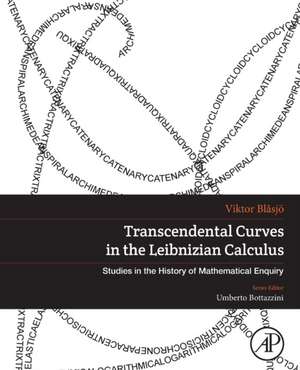Transcendental Curves in the Leibnizian Calculus: Studies in the History of Mathematical Inquiry
Autor Viktor Blasjoen Limba Engleză Paperback – 19 apr 2017
As late as 1637, Descartes had placed himself squarely in this tradition when he justified his new technique of identifying curves with equations by means of certain curve-tracing instruments, thereby bringing together the ancient constructive tradition and modern algebraic methods in a satisfying marriage. But rapid advances in the new fields of infinitesimal calculus and mathematical mechanics soon ruined his grand synthesis.
Descartes's scheme left out transcendental curves, i.e. curves with no polynomial equation, but in the course of these subsequent developments such curves emerged as indispensable. It was becoming harder and harder to juggle cutting-edge mathematics and ancient conceptions of its foundations at the same time, yet leading mathematicians, such as Leibniz felt compelled to do precisely this. The new mathematics fit more naturally an analytical conception of curves than a construction-based one, yet no one wanted to betray the latter, as this was seen as virtually tantamount to stop doing mathematics altogether. The credibility and authority of mathematics depended on it.
- Brings to light this underlying and often implicit complex of concerns that permeate early calculus
- Evaluates the technical conception and mathematical construction of the geometrical method
- Reveals a previously unrecognized Liebnizian programmatic cohesion in early calculus
- Provides a beautifully written work of outstanding original scholarship
Preț: 687.81 lei
Preț vechi: 900.43 lei
-24% Nou
Puncte Express: 1032
Preț estimativ în valută:
131.63€ • 134.80$ • 109.49£
131.63€ • 134.80$ • 109.49£
Carte tipărită la comandă
Livrare economică 12-26 martie
Preluare comenzi: 021 569.72.76
Specificații
ISBN-13: 9780128132371
ISBN-10: 012813237X
Pagini: 282
Dimensiuni: 191 x 235 x 21 mm
Greutate: 0.49 kg
Editura: ELSEVIER SCIENCE
Seria Studies in the History of Mathematical Inquiry
ISBN-10: 012813237X
Pagini: 282
Dimensiuni: 191 x 235 x 21 mm
Greutate: 0.49 kg
Editura: ELSEVIER SCIENCE
Seria Studies in the History of Mathematical Inquiry
Public țintă
PhD students and tenured mathematicians and historians of mathematics with an interest in the early history of calculus and geometry. Leibniz scholars will naturally be most attracted to the content.Cuprins
1. Preliminary matters2. Introduction3. The classical basis of 17th-century philosophy of mathematics4. Mathematical context5. Transcendental curves by curve tracing6. Transcendental curves analytically: exponentials and power series7. Transcendental curves by the reduction of quadratures8. Transcendental curves in physics9. A view from the 18th century10. Concluding overview
Recenzii
"One of the general philosophical teachings that I have learned from this book is to cast doubt on certain modes of thinking that are so engrained in our everyday practice (as scientists and philosophers) to become accepted standards of rationality." --Zentralblat MATH
"This is the story of the right historical context for the development of the Leibnizian calculus.To present a clear picture of the time and of the type of problem animating research in the 17th century, the author first delves into the philosophical context, all practitioners claiming allegiance to the ancient Greeks, but with a continental vs. British difference." -- MathSciNet
"Blåsjö does an excellent job. His study is informative, well organized, thought provoking, clearly written and thoroughly researched. … Blåsjö’s work provides a great service to the mathematical community." -- MAA Reviews
"This book tells the unique and fascinating story of the early calculus, focusing on Leibniz’s publications." -- zbMATH
"This is the story of the right historical context for the development of the Leibnizian calculus.To present a clear picture of the time and of the type of problem animating research in the 17th century, the author first delves into the philosophical context, all practitioners claiming allegiance to the ancient Greeks, but with a continental vs. British difference." -- MathSciNet
"Blåsjö does an excellent job. His study is informative, well organized, thought provoking, clearly written and thoroughly researched. … Blåsjö’s work provides a great service to the mathematical community." -- MAA Reviews
"This book tells the unique and fascinating story of the early calculus, focusing on Leibniz’s publications." -- zbMATH

